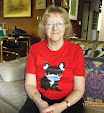Chapter 1: My first decade at home in the 1950's.
When I read stories of child abuse in the media, I realise how lucky I was to have a childhood where I was loved and protected. I took it for granted that I was clothed, fed and educated. As I was the only daughter in the family, I also took it for granted that I had my own bedroom, but I still appreciated that fact. I could shut myself in there and listen to music, read, stick posters on the walls, and so on. It was my personal space and I loved it. Periodically I would be told to clean up my room. For me, the easiest way to achieve this was to shove everything on the floor under my bed. I couldn't understand how Dad knew to look under the bed first, when he came in to check on my progress. Of course I had to pull it all out and start again.
My older brothers Ian and Bryan shared a bedroom. You could have drawn a line down the middle of the room. Ian is 10 years old than me, and his side was neat and tidy, and had his model trains running around the walls on his side of the room. I liked to watch him working on his models. Sometimes he would allow me to help him glue the ballast (chopped cork pieces) to the tracks. Bryan is two years younger than Ian, and his side of their room was disgusting. His clothes were strewn everywhere, and when he started smoking in his teens, the room stunk of smoke, even though he wasn't allowed to smoke in the house. The smell came from his clothes and the butts that fell out of the pockets. When he started work at the age of 14, he had no regard for money. He would leave all his small change lying around - on the floor, on his dressing table, in his pockets - anywhere. Mum gave up telling him to save it, and started to pick it up herself and put it aside. Every so often she would have enough to put into the bank. On Bryan's 21st birthday, Mum presented him with a bank book showing a balance of several hundred pounds - a huge sum of money in those days. He was speechless, but I think he learnt the meaning of 'look after the pennies and the pounds will look after themselves', and was more careful.
In the early 1950's Ian and Bryan built a cubby house at the bottom of the back yard. I wasn't allowed to go there because I was too little. One day when the boys weren't home, I was playing in it, and I must have found some matches. The cubby house caught fire with me still inside, and it was only quick work by Dad and possibly some neighbours, using the hose to douse the fire, that probably saved my life, although the cubby house didn't survive. Ian and Bryan were extremely annoyed about losing their cubby house, and I don't think they were allowed to build another one until I had grown a bit and accumulated some common sense. It's a wonder I don't have a phobia about fires after that!
Ian had endless patience with his little sister. One day he brought home a new record (78 RPM) "The Poor People Of Paris" by Les Baxter. He played it once, then left it on the couch in the lounge room, to put away later. Unfortunately, somebody inadvertently put a cushion over it, and I was bouncing around on the couch later on, and heard an ominous crack under the cushion. I don't recall being punished for this; in fact I think Dad told the boys that it was a lesson to be learned - put things away in their rightful place when you have finished with them. Dad must have temporarily forgotten his own advice one day. He still had his childhood stamp collection and one day it was lying around in a spot where little hands could reach it. I was discovered tearing "all the dirty old bits of paper" out of the album! I must have been an awful nuisance to everybody at times!
When I was about 8 years old, my parents gave me my first wrist watch, and I was so thrilled and proud! It probably doesn't mean as much these days, but back in the 1950's watches were usually Swiss made and gold or silver. No battery operated throw away plastic watches then! Not long after I got mine, I was playing with a friend in a park. We were jumping around as little girls do, when my watch flew off my arm into the long grass. The band must have been loose, or the catch faulty. We searched for hours, but didn't find it. Mum was fuming all the way home. "Your father will kill you. He paid a lot of money for that watch. How could you be so careless?" By the time Dad got home from work that night, I was nearly hysterical. I waited at the front gate for him to turn the corner into our street, and as soon as I saw him I raced up the street crying "Dad, I lost my watch! I'm sorry, I didn't mean to". Dad dropped his briefcase and scooped me up in his arms. "It's all right," he soothed. "Don't worry, we can buy you another watch". Mum scolded him: "You spoil that child" but Dad remonstrated with her. "Come on dear, can't you see how upset she is? Don't be so hard on her - she didn't lose the watch on purpose". That was just one example of his kindness and how fair he was.
